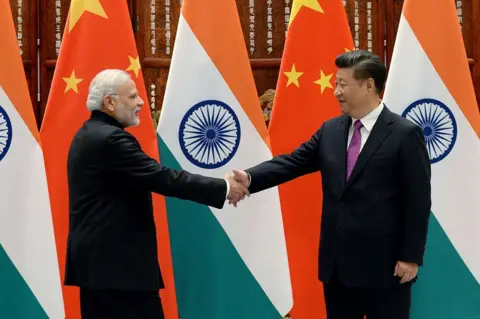This is a time for us to engage America, manage China, cultivate Europe, reassure Russia, bring Japan into play, draw neighbours in, extend the neighbourhood and expand traditional constituencies of support, Indian Foreign Minister S Jaishankar wrote in his 2020 book The India Way: Strategies for an Uncertain World.
For over a decade, India has styled itself as a key node in a new multipolar order: one foot in Washington, another in Moscow, and a wary eye on Beijing.
However, the current geopolitical landscape indicates cracks in this structure. Under Donald Trump's administration, relationships have soured, with rising criticism from the US regarding India's support for Russia, particularly through oil purchases that have funded Moscow's military operations.
Modi's planned meeting with Xi Jinping appears less like victory diplomacy and more like a necessity for pragmatic engagement. India finds itself in a precarious position, acting as a central player in both the US-aligned Indo-Pacific Quad and the Russia-China led Shanghai Cooperation Organisation (SCO).
The balancing act India is attempting reflects a broader philosophy of maintaining strategic autonomy crafted through varied alliances. Analysts underscore this 'hedging' strategy, emphasizing the need for India to navigate its relationships carefully to maintain leverage in a tumultuous global environment.
India's global ambitions, however, are not matched by its economic capabilities. As the fifth-largest economy, its military-industrial base is notably limited, amplifying the challenges it faces on the world stage.
In dealing with China, India has historically faced aggression and border tensions. Efforts at dialogue occur amid subdued competition, as evidenced by comments from Chinese diplomats emphasizing friendship over enmity. Yet, skepticism remains about the motivations behind this outreach and the benefits for India.
With Russia, India has maintained ties by continuing to procure discounted energy resources, showcasing unease towards US pressure. Previous cold spells in US-India relations suggest that despite current challenges, foundational interests might foster future cooperation.
Journalists and analysts express a spectrum of opinions regarding India's strategic choices; from accusations of indecisiveness to recognition of autonomy in an increasingly intricate world where bipartisanship is failing.
Ultimately, India's ability to adapt will likely determine its role and influence in global affairs, as it absorbs pressures from rivals and seeks paths to reinforce its standing.




















